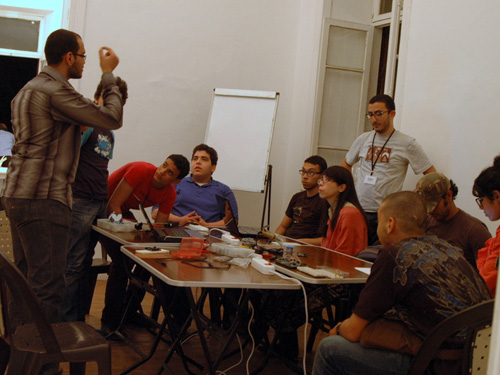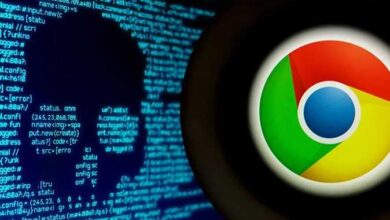
Usually, the word “hacker” brings to mind lonely, late-night computing and the ability to break through virtual walls, often employed for extra-legal purposes.
But Tarek Ahmed, a founding member of the Pop-Up Hackerspace, says that impression is wrong.
“Really, a hacker is just someone who is an inventor, and who is very good at what he does,” says Ahmed.
Hackerspaces such as the one Ahmed cofounded in Cairo have very little to do with breaking into banking software or pirating videos — but they are very interested in sharing information.
A hackerspace is a place where people gather together to build things that have never been built before, teach each other new things, and generally indulge their imaginations and creative impulses. It is a space filled with materials and friends where, as Cairo hacker Asef AlDin says, “you come to do what you love.”
There are some 900 hackerspaces across the world today, closely connected through the internet. When Ahmed decided he wanted to start Egypt’s first, he didn’t gather his acquaintances for a meeting or search around for a space.
“I just lied,” he says.
He created a profile at Hackerspaces.org, claiming to already have a space up and running. Eventually, people got in touch, and Ahmed and a group of electronics and mechanics enthusiasts began meeting in coffee shops to brainstorm and make plans.
Soon, what was once a lie became truth. Now the group membership hovers around 14 members, including a university professor, a prodigious 16-year-old and a pair of women whose interests lie in biological — rather than electronic — hacking, but who hack all the same.
The concept of the hackerspace arose out of internet-based knowledge-sharing movements like Copyleft that seek to keep information both free to share and free to be modified (and shared again). The Pop-Up Hackerspace, along with its hundreds of kindred spaces, adheres to the open source philosophy of providing along with any innovation or product the means of creating it.
It is a way of working rooted in the fluidity of knowledge on the internet, but the hackerspace is very much of the physical world. It is a place where people gather together and tinker with machines in real life, using their hands and speaking to each other out loud, joining together the community-building and knowledge-sharing capacities of the internet with the desire for hands-on creation that can emerge from life lived online.
Since its members' early days of hacking in coffee shops, the Pop-Up Hackerspace has become much more established. Its members recently relocated their entire operation from a space in Mohandiseen to the Townhouse first floor gallery.
For the next 10 days they will hold nightly workshops in the gallery, teaching skills like soldering, building a projector, making art out of LED lights and, most importantly, programming microcontrollers — the small, easily coded computer board that forms the core of many of the hackers' projects and that Asef AlDin describes as “the holy grail of hacking.”
The microcontroller in particular is a technology embraced by artists — such as Egyptian artist Magdy Mostafa — interested in incorporating electronic and mechanical functions into their work. It is appealing because it does not take a specialized knowledge to manipulate, and can be used in a wide variety of ways. According to the hackers, there are often artists who come to their space to learn how to use these kinds of tools.
Despite this artistic connection, the hackers might seem a surprising presence in an art gallery. But the Pop-Up Hackerspace began its relationship with Townhouse some time ago. The group was originally meant to be a part of a series of events to accompany the exhibition d1sc0nN3ct, which focused on Glitch art, an art of obstruction and creative destruction that shares with the Hackerspace an anti-materialist, open source philosophy and seeks to disrupt capitalist systems of distribution. Because of unrest in the downtown area, the events series was canceled, but Ania Szremski, who curated d1sc0nN3ct, still wanted to bring the Hackerspace into the gallery.
Since the hackers moved in, the gallery has been transformed into something reminiscent of a high school shop class, but buzzing with energy. As one hacker gives a detailed seminar on how to manipulate the microcontroller, a group in an adjacent room is rigging up a projector to cast the image of a person making wild, fast-changing faces onto the face of a live person sitting in a chair.
The effect is a kind of comical image of ghostly possession, and the episode underlines that the hackerspace is more about play than about problem solving. They sometimes make things that are useful, but that is not necessarily the point.
In another room, a demo is being run on the “Egg-bot,” a machine that decorates eggs and pingpong balls with precise patterns, simply by rotating the egg around underneath a pen. Later, the “MakerBot,” a 3-D printer that is connected to a computer and creates objects out of layered plastic, “prints” out a tiny hand.
Watching the maker-bot at work, AlDin explains its significance, saying, “It means you have downloadable objects,” indeed a somewhat mind-blowing proposition.
Recently the hackers built a prototype for a book scanner that uses two digital cameras rigged up together to take quick images of book pages as they are turned. According to Ahmed, it can scan 1,000 pages in 20 minutes, and when uploaded into a computer, a software program stiches the images together into a PDF, and an electronic book is born.
It is a prototype that exists on the internet, not something that was invented by the hackers in Cairo, but they will build one, improve on it, and share what they find with the community. This is how hackerspaces work. There is no hording of knowledge, no expensive equipment and no fancy materials.
And, as both those searching for an art exhibition and those hoping to learn how to solder pass through the Townhouse gallery, the hackers draw in all comers. They are eager to teach, to bring in new members, to share the machines that they have made and to pass on their unfettered enthusiasm for creation.
And, when their time at Townhouse ends, the group hopes to find a space downtown, not only because it is conveniently central, but because it is the best place in the city to find any and every mechanical piece imaginable.
The Pop-Up Hackerspace at Townhouse is open nightly from 6 pm to 9 pm, until 18 April. For more information visit its Facebook page or website.







